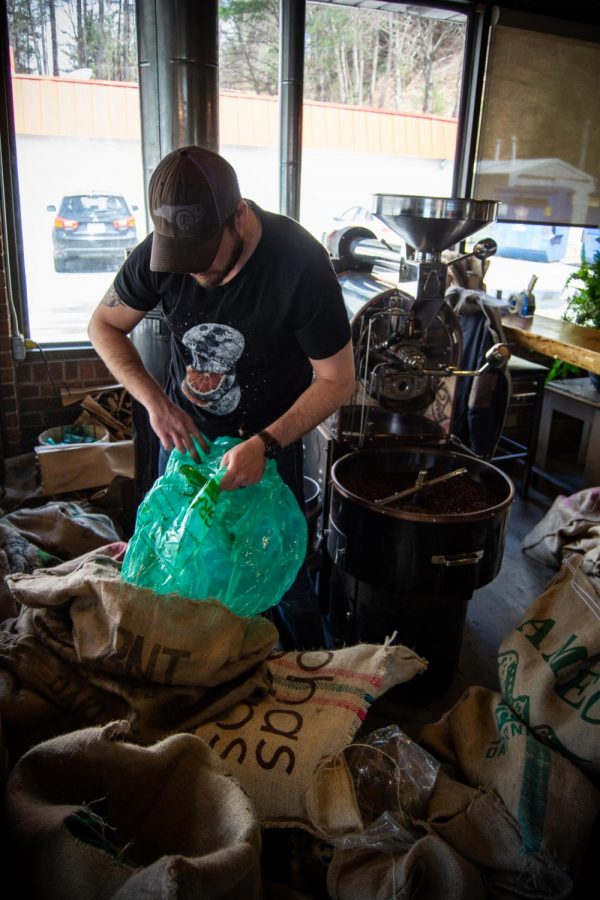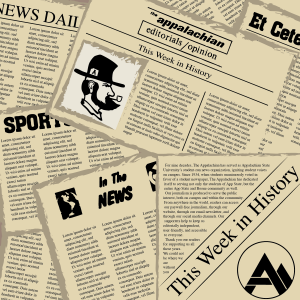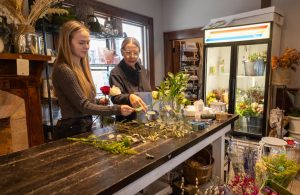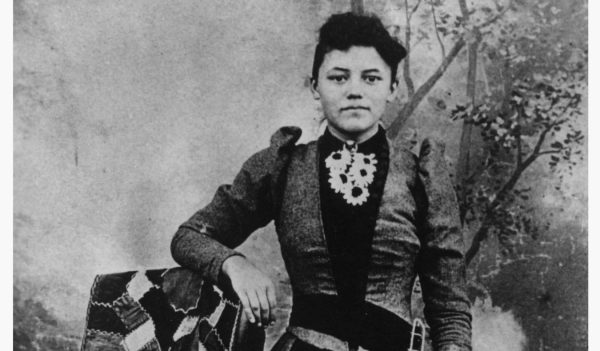Boone coffee shops use beans from around the world to bring great tastes to Boone
David Tatum siphons through coffee bean sacks behind Local Lion’s roasting station. Tatum is the primary roaster at Local Lion Espresso Bar.
April 18, 2019
Everything has a story, even the beans that make up your morning coffee. Local roasters at Hatchet Coffee and Local Lion are passionate about making quality coffee from farms they trust.
When choosing farms to buy from, Local Lion primary roaster David Tatum said he always chooses smaller farms that work hard and support their communities.
Tatum buys from Direct Trade, a group of small coffee farms in Nicaragua that prioritize sustainability.
“Direct Trade uses organic practices, but they were spending all their money on things like a school for their workers’ kids and we wanted to support that,” Tatum said.
Hatchet Coffee owners Jeremy Parnell and Jeremy Bollman said they see the importance of shaking the farmer’s hand.
“We use an importer called Cafe Imports. They spend a lot of time investing in smaller farms to increase the wages for the farmers,” Parnell said.
Parnell said Cafe Imports is transparent about work conditions and how they grow the beans. The farm has invited Hatchet workers to visit origin countries, which are regions 20 degrees north and south of the equator that grow coffee.
“I went down to Peru, the other Jeremy went to Mexico and Guatemala, our social media rep went to Guatemala, our manager went to Colombia, and we are sending one of our baristas to Brazil,” Parnell said.
Hatchet sends its workers to origin countries to see how the coffee is made and how the farms treat workers. They also bring coffee back with them, Parnell said.
Many decisions, like where the coffee is grown and how the beans are processed, affected which roasts employees brought back to Boone.
“You can kind of tell how the coffee is going to taste just on the region,” Parnell said. “Africans are fruity. Central and South Americans are breakfast coffees, so they are more chocolatey. Sumatra and Indonesia are more earthy tasting.”
The region determines the taste of the coffee and how the beans were processed.
Once they pick the coffee “cherry” off the tree, workers use either a natural or washed method to get the seeds out.
“If you have access to a lot of water, you can wash all the slimy stuff off,” Parnell said. “A natural (method) is after you pull the cherry off, you dry the cherry so the seed inside will take on the cherry characteristics because it is fermenting in there,” Parnell said.
The natural method makes coffee beans sweet and the washed method produces a crisp taste, according to the National Coffee Association.
After the farm processes and dries the beans to the desired taste, exporters ship the beans to the East Coast.
Local Lion works with two warehouses in New Jersey and Florida, which store the beans until he can roast them, Tatum said.
Tatum said he is constantly creating new blends by combining two or three varietals together. He will mix different tastes like nuttiness from Brazil, peachiness from Peru and the chocolate flavor from Guatemala to create the final cup.
Varietals are beans from a single origin country such as Ethiopia or Colombia, and blends are a mix of varietals, such as a house blend or a morning blend, according to Roast Magazine’s Daily Coffee News.
“Our drinks are more cocktail-inspired. We can get really playful with our drinks, it’s not standard coffee so it’s good for bringing new coffee drinkers in,” Parnell said.
Parnell said Hatchet released a year-round brew of “magic blend,” which combines naturally dried Brazilian and Ethiopian varietals and a washed Ethiopian varietal.
Roasting coffee is about experimenting to create new blends for customers to try, Tatum said.
“Once we find which one we like, we will give Shelly (Parsons) a sample, and she will then pick which ones will be sold in the stores,” Tatum said.
Parsons manages Wired Scholar and Crossroads Coffee House on App State’s campus and works with Tatum to supply coffee for the shops.
“There is coffee that is $50 per pound, but I can’t sell that to a college student,” Parsons said. “What I do is pick a coffee that I am happy with the practices, has a great taste and fits within the price margin.”
Parsons said she works with Tatum to train baristas in Crossroads Coffee House and Wired Scholar.
“It’s a combination of the best coffee we can buy, the most affordable price, the best-trained barista and at the quickest pace,” Parsons said.
An untrained barista can alter the taste created through washing, drying and roasting the beans.
Boone coffee shops have a sense of connection through their shared love of coffee, Tatum said.
“(Local Lion) is not professionally affiliated with Hatchet Coffee, just personally affiliated,” Tatum said. “That’s what I love about the coffee industry, is that there is enough demand around that we aren’t competing with each other. I prefer collaboration over competition—it can only increase the knowledge and the value of what we are all doing together.”












